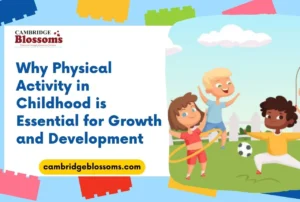Introduction
If you are a new parent, then stop making these common mistakes of early childhood education. Early Childhood Education (ECCE) plays a fundamental role in shaping a child’s cognitive, social, emotional, and physical development. These early years lay the foundation for lifelong learning, making it essential to provide high-quality educational experiences that foster creativity, curiosity, and a love for learning.
In India, the significance of ECCE has been acknowledged through the National Education Policy (NEP) 2020, which emphasizes early learning as a crucial stage of education. However, despite its importance, many common mistakes in ECCE continue to hinder children’s development.
Parents, educators, and caregivers often unintentionally make errors that affect a child’s ability to learn, grow, and adjust to a structured environment. Recognizing these pitfalls can help ensure a smoother educational journey. This blog will explore seven critical mistakes in early childhood education and how to avoid them.
Understanding Common Mistakes in Early Childhood Education
Mistakes in ECCE can have lasting effects on a child’s development. Identifying and rectifying these issues ensures children receive the support they need to thrive academically and socially.
Why It Matters
- Mistakes in ECCE can slow down social and emotional growth.
- They may lead to developmental delays that are hard to correct later.
- Poor early education strategies can create an aversion to learning.
- Many errors stem from outdated teaching methods, lack of awareness, or cultural norms.
In India, challenges such as accessibility, affordability, and parental engagement further impact ECCE quality. Addressing these concerns holistically is essential for effective early learning experiences.
Common Mistakes in Early Childhood Education That Need to be Avoided
1. Forgetting to Adequately Prepare the Child for Preschool

A smooth transition into preschool starts with proper preparation. Many parents assume that teachers will handle everything, but helping a child adjust before they enter preschool can significantly ease the process.
How to Prepare:
- Talk to your child about what to expect in preschool.
- Read books about preschool experiences.
- Visit the school beforehand to familiarize them with the environment.
- Address separation anxiety by gradually increasing the time your child spends away from home.
In India, many children do not attend daycare before preschool, making the transition even more challenging. Parents should help children adapt by creating a structured routine at home before starting school.
2. Overlooking the Importance of Communication Between Parents and Teachers

Strong parent-teacher communication is essential in ECCE. Many parents believe their involvement is only required when problems arise, but staying engaged in their child’s education fosters a more effective learning environment.
Why Communication Matters:
- Helps parents track their child’s progress.
- Encourages early intervention in case of learning difficulties.
- Builds a partnership between educators and parents.
How to Improve Communication:
- Attend parent-teacher meetings regularly.
- Use digital communication tools like school apps or WhatsApp groups.
- Ask teachers for feedback on your child’s progress.
Many Indian parents face language or cultural barriers when communicating with teachers. Schools should offer multilingual communication channels to bridge this gap.
3. Forgetting to Label Everything

Preschool children frequently lose their belongings, making labeling essential.
What to Label:
- Water bottles
- Lunchboxes
- Bags
- Clothing items like jackets and shoes
Using name stickers or permanent markers can prevent confusion and reduce the chances of lost items.
4. Not Encouraging Independence

Fostering independence in young children helps build confidence and problem-solving skills. Many parents unintentionally do everything for their child, depriving them of opportunities to learn essential life skills.
Encouraging Independence:
- Let children dress themselves.
- Teach them how to clean up after playtime.
- Encourage them to express their needs and preferences.
In India, overprotective parenting is common due to cultural values. While care and protection are essential, children also need autonomy to develop resilience and confidence.
5. Overestimating a Child’s Abilities

Expecting too much from a preschooler can lead to frustration for both parents and children. Preschool is a new environment, and adjusting takes time.
Common Struggles:
- Difficulty following instructions.
- Struggles with social skills.
- Challenges in toilet training.
How to Address This:
- Be patient and set realistic expectations.
- Work closely with teachers to track progress.
- Provide additional support if needed.
Every child develops at their own pace. Pressuring them to meet unrealistic academic or social milestones can create unnecessary stress.
6. Comparing a Child to Others

Comparison is one of the biggest mistakes parents and educators make. Every child is unique and has their own strengths.
Why Comparisons are Harmful:
- Creates unnecessary pressure.
- Lowers self-esteem.
- Discourages children from trying new things.
What to Do Instead:
- Focus on individual progress.
- Celebrate small achievements.
- Encourage children to develop their own interests.
Indian society places immense importance on academic performance, often leading to comparisons among peers. Parents should resist this pressure and instead celebrate their child’s unique journey.
7. Not Allowing Time for Play

Play is a fundamental part of learning. Many parents and schools prioritize academics over playtime, not realizing that play-based learning is just as crucial.
Benefits of Play:
- Improves social skills.
- Encourages creativity and problem-solving.
- Strengthens physical coordination.
How to Incorporate Play:
- Allow unstructured playtime daily.
- Provide opportunities for outdoor activities.
- Encourage storytelling, role-playing, and group games.
In India, many schools still emphasize rote learning over interactive play. Integrating structured and unstructured play into daily learning can create a more balanced educational experience.
The Role of Early Childhood Education Centers
A high-quality ECCE center plays a crucial role in a child’s development.
What Makes a Good ECCE Center?
- Low student-to-teacher ratio.
- Well-trained educators.
- A curriculum focused on holistic learning.
Cambridge Blossoms: A Top Preschool in Guwahati and Assam
Cambridge Blossoms is an excellent example of a preschool that emphasizes experiential learning and holistic development. Their approach includes:
- Play-based learning.
- Encouraging parental involvement.
- Creating a safe and engaging environment for children.
Parents looking for a quality preschool should consider institutions that prioritize these values.
Addressing Challenges in ECCE in India
Despite improvements, ECCE in India faces significant challenges:
- Affordability: Quality education can be expensive for many families.
- Accessibility: Many rural areas lack well-equipped preschools.
- Parental Involvement: Busy work schedules limit parent participation.
Government initiatives such as the NEP 2020 aim to improve access and quality. However, community support and parental engagement are equally important.
Conclusion
Avoiding these common mistakes in early childhood education can make a significant difference in a child’s developmental journey. By preparing children for preschool, maintaining strong communication with teachers, encouraging independence, and ensuring a balance between academics and play, we can create a more effective learning environment.
Parents and educators must work together to prioritize ECCE, ensuring children receive the best possible start in life. Investing in early education today lays the foundation for a brighter future.




